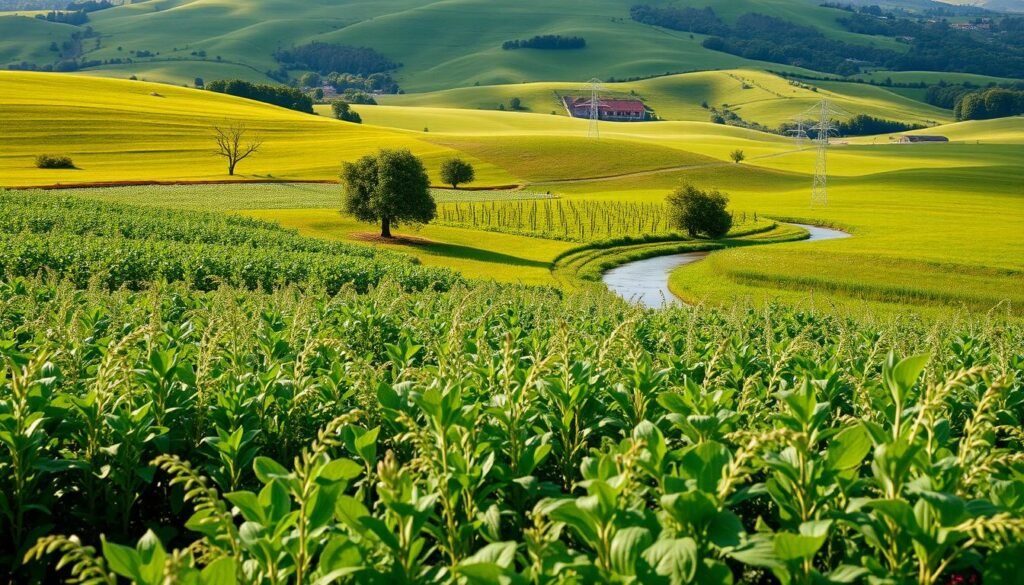A huge 70% of the world’s freshwater is used for farming. This shows we need sustainable farming methods. It’s key for a healthier and greener future.
Using sustainable farming is vital. It lessens farming’s harm to the environment, keeps soil healthy, and saves water. Farmers adopting these methods can fight climate change, protect nature, and feed future generations.
Introduction to Sustainable Agriculture
Sustainable farming focuses on the environment, economy, and society’s health. It uses eco-friendly ways like crop rotation and organic farming. These methods improve soil, save water, and cut down on harmful chemicals.
Key Takeaways
- Sustainable agriculture practices can help reduce the environmental impact of farming
- Eco-friendly farming methods can promote soil health and conserve water
- Sustainable agriculture can help mitigate climate change and protect biodiversity
- Adopting sustainable agriculture practices can ensure a stable food supply for future generations
- Sustainable agriculture prioritizes the long-term health of the environment, economy, and society
Understanding Sustainable Agriculture Practices
Sustainable agriculture focuses on the environment, social justice, and making farming work financially. It’s vital today because of issues like climate change and soil loss. Organic farming techniques and regenerative agriculture are key. They help keep soil healthy, support biodiversity, and use water wisely.
This approach aims to protect natural resources for the future. It means using less waste, fewer synthetic chemicals, and more natural ways to help the environment. Regenerative agriculture helps farmers make their soil better, grow more food, and help local wildlife.
Some big pluses of sustainable farming are:
- Soil health gets better with organic farming techniques
- It boosts biodiversity and helps ecosystems
- It uses water better and cuts down on waste
- It helps local communities and economies
By choosing sustainable farming, we make our food system stronger and better for everyone. As shoppers, we can help by picking products grown with regenerative agriculture and organic farming techniques. We can also push for policies that support these practices.
Benefits of Sustainable Agriculture
Sustainable agriculture brings many benefits. It helps the environment, boosts the economy, and improves lives in communities. Farmers use strategies to keep soil healthy, which leads to more crops and cleaner water.
One important practice is sustainable crop rotation. It keeps soil fertile, fights pests, and supports different plants. This method cuts down on harmful chemicals, protecting our air, water, and soil.
Environmental Advantages
- Reduced soil erosion
- Improved soil health
- Increased crop yields
- Better water quality
Economic Benefits
Sustainable farming also helps farmers’ pockets. It makes farms more profitable and improves farmers’ lives. By using green methods, farmers save money and earn more.
Social Impact on Communities
Sustainable farming is good for communities too. It fights for fairness and ensures workers are treated right. When we choose sustainable food, we support fair work and better lives for farmers and their families.
Key Principles of Sustainable Agriculture
Sustainable agriculture focuses on ecological balance and conservation. It uses green farming practices to keep soil healthy, support biodiversity, and use water wisely. These methods help farmers lower their environmental impact and keep their land productive for years.
Some important principles of sustainable agriculture are:
- Maintaining soil health with natural fertilizers and conservation tillage
- Promoting biodiversity by growing different crops and using crop rotation
- Using efficient water conservation, like drip irrigation
Sustainable livestock management is also key to reducing farming’s environmental impact. It involves caring for animals by giving them enough space and using natural feeding methods. By combining green farming with sustainable livestock care, farmers can make their farms more sustainable and eco-friendly.
Techniques for Sustainable Farming
Sustainable farming focuses on the long-term health of the environment, crops, and communities. Eco-friendly methods like regenerative agriculture are key. They improve soil health, reduce environmental harm, and make farms more resilient. This approach helps create a better food system.
Effective techniques for sustainable farming include:
- Crop rotation, which keeps soil fertile and fights pests and diseases
- Agroforestry, which adds trees to farms to boost biodiversity and ecosystem services
- Organic farming, which avoids synthetic fertilizers and pesticides for a healthier environment and safer food
Regenerative agriculture is a major part of sustainable farming. It aims to improve soil health, enhance water cycles, and support ecosystems. By using eco-friendly methods and regenerative agriculture, farmers can help make our food system more sustainable. They also play a role in fighting climate change.

The Role of Technology in Sustainable Agriculture
Technology is key in making farming more sustainable. It helps keep the soil healthy and cuts down on harm to the environment. By using green farming methods, farmers can use fewer chemicals and save water. This also helps protect the soil and encourages more life in it.
Important tech in farming includes precision farming, smart pest control, and saving water. These tools help farmers grow more food with less waste. For instance, precision farming uses sensors to check soil and crops. This lets farmers make better choices about when to water and fertilize.
Using these technologies, farmers can help the planet and ensure we have enough food. The good things about these tools are:
- More food grown and less thrown away
- Healthier soil and more life in it
- Less water used and pollution made
- Farming is more efficient and productive
In short, tech in farming can change how we grow food. It makes our food system better for the planet and for us.
Sustainable Livestock Management
Sustainable livestock management is key for animal health and environmental care. Organic farming techniques use natural pest control instead of chemicals. This way, farmers can lower their environmental impact and help biodiversity.
Important aspects of sustainable livestock management include:
- Ethical treatment of animals, ensuring their welfare and well-being
- Grass-fed vs grain-fed practices, and the impact on animal health and environmental sustainability
- Certifications to look for, such as organic or regenerative agriculture labels
By focusing on sustainable livestock management, farmers help create a better food system. This approach benefits animals, the environment, and supports green farming practices and organic farming techniques.
Supporting Local Farmers and Sustainable Practices
By choosing sustainable farming, we help the environment and support local farmers. Eco-friendly farming cuts down on chemicals and saves soil. Shopping at local farmers’ markets is a great way to support this.
Benefits of Farmers’ Markets
Farmers’ markets offer many benefits. They give us fresh, local food and help local farmers. Some key advantages include:
- Fresh, seasonal produce
- Support for local farmers and the local economy
- Opportunities to learn about sustainable agriculture practices
Community Supported Agriculture (CSA)
CSA programs let people buy shares of a farm’s produce. This helps farmers and gives us fresh, local food. It also strengthens the bond between farmers and their communities.
Policy and Regulation in Sustainable Agriculture
Sustainable agriculture is guided by policies and regulations. They aim to promote green practices, support local farmers, and protect ecosystems. Regenerative agriculture is gaining attention for its focus on ecosystem services and farm resilience. It’s closely linked to soil conservation strategies, which are vital for soil health and biodiversity.
The Environmental Protection Agency (EPA) sets guidelines for farmers to lessen their environmental footprint. Local farming policies also support sustainable practices. They encourage less chemical use and water conservation.

Environmental Protection Agency (EPA) Guidelines
The EPA offers guidelines for farmers to reduce their environmental impact. These include strategies for less chemical use, water conservation, and soil health. These guidelines are key for sustainable agriculture and reducing farming’s environmental effects.
Local Farming Policies
Local policies are crucial for promoting sustainable farming. They vary by region but often include organic certification programs and incentives for sustainable practices. These policies help farmers adopt greener methods.
Future Legislation Trends
Future laws will likely support sustainable agriculture, focusing on regenerative agriculture and soil conservation strategies. As more people want sustainable products, lawmakers will introduce bills that favor eco-friendly farming.
Challenges Facing Sustainable Agriculture
Sustainable agriculture is key for a greener future. But, it faces many challenges. Climate change affects crop yields and farming methods. Green farming practices help by saving soil and reducing harm to the environment.
Some big challenges for sustainable agriculture are:
- Climate change impacts on crop yields and farming practices
- Economic viability of sustainable agriculture practices
- Consumer awareness and education about sustainable agriculture
Despite these hurdles, sustainable agriculture practices and green farming practices are vital. They help protect the environment and ensure food security. Farmers can lessen their environmental impact and save soil by using these methods.
Supporting sustainable agriculture and green farming practices is important. It helps make our food system healthier and more sustainable. Consumers can make a big difference by choosing these options.
Education and Awareness in Sustainable Practices
The world is moving towards a sustainable future, and education is key. Organic farming and sustainable livestock management are important. They help keep soil healthy and reduce harm to the environment.
Many groups are helping by teaching about sustainable farming. The National Sustainable Agriculture Coalition supports farmers who want to be more sustainable. Schools are also adding courses on sustainable agriculture, preparing the next generation.
Here are some resources for farmers and those in agriculture:
- Online courses and workshops on organic farming and sustainable livestock
- Guides and manuals from the USDA’s National Organic Program
- Networking with other farmers and professionals
Education and awareness help us build a better food system. We can support sustainable farming by buying organic or local. We should also push for policies that help sustainable farming.
The Future of Sustainable Agriculture
The world is facing big environmental challenges, but sustainable agriculture has a bright future. Farmers are now focusing on regenerative agriculture. They care about soil health, biodiversity, and ecosystem services. This not only helps the environment but also makes farms more resilient and productive.
Watch for more eco-friendly farming methods becoming common. Farmers are using organic fertilizers, conservation tillage, and crop rotation. These methods help reduce environmental harm while keeping or boosting crop yields.
Trends to Watch
- Increased adoption of regenerative agriculture practices
- Growing demand for eco-friendly farming methods
- More collaborations between farmers, scientists, and consumers
Collaborations Between Farmers and Scientists
Working together is key for sustainable agriculture’s progress. Farmers and scientists can create and use new tech and practices. This helps the environment and boosts farm productivity.
How You Can Contribute to Sustainable Agriculture
While big changes in farming are important, you can help too. By choosing what you buy and joining local efforts, you can make a difference. This helps create a greener, healthier world for all.
Support brands that focus on sustainable farming. Look for labels like USDA Organic or Regenerative Organic. These show the products are made with care for the soil and the planet. Also, try to use less food by planning meals and composting.
Join your community by going to farmer’s markets or CSAs. These places offer fresh, eco-friendly food and connect you with local farmers. By supporting these efforts, you help build a better farming future.



